NewsBrief, 14-27 July 2015
- AU leaders call for strong African response to Ebola
- Stakeholders examine progress on the Great Green Wall
- President Obama announces women's entrepreneurship centre in Bamako
- Burkina Faso secures financing for solar power plant
- UEMOA: Review of integration process ahead of summit
- African parliamentarians form network
- FAO calls for USD 20 million to fight bird flu
- SWAC viewpoint: Changing demographics pulling up agriculture
- Who's Who? Xavier Crespin, Director General of the West African Health Organisation
The next NewsBrief will be published on 10 August 2015.
AU leaders call for strong African response to Ebola
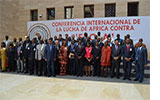 African presidents vowed to banish Ebola from the continent as they gathered on 21 July in Malabo for the African Union's first international conference devoted to post-Ebola recovery and reconstruction. Current AU Chairman Robert Mugabe called for greater solidarity with the most affected countries, Guinea, Liberia and Sierra Leone. Equatoguinean President and summit host Teodoro Obiang Nguema Mbasogo called for the establishment of a fund to support affected countries as well as the creation of a prevention and control centre for the fight against the Ebola disease. The AU Commission said the continent must urgently find an effective cure for the disease. While the epidemic is now largely under control in the three affected countries, African policymakers must remain focused on its total and permanent eradication. Numerous contributions have been announced, including USD 300 million by the AfDB and USD 5 million from China. An African response is being prepared to take the reigns when the United Nations Mission for Ebola Emergency Response (UNMEER), deployed in September 2014, finishes its mandate on 31 July. Relying on the capacities of several international partners and in co-ordination with regional organisations like the AU and ECOWAS, its teams continue to work to focus actions around five priorities: halting the spread of the virus, treating the ill, providing essential services, maintaining stability and preventing further outbreaks of the disease.
African presidents vowed to banish Ebola from the continent as they gathered on 21 July in Malabo for the African Union's first international conference devoted to post-Ebola recovery and reconstruction. Current AU Chairman Robert Mugabe called for greater solidarity with the most affected countries, Guinea, Liberia and Sierra Leone. Equatoguinean President and summit host Teodoro Obiang Nguema Mbasogo called for the establishment of a fund to support affected countries as well as the creation of a prevention and control centre for the fight against the Ebola disease. The AU Commission said the continent must urgently find an effective cure for the disease. While the epidemic is now largely under control in the three affected countries, African policymakers must remain focused on its total and permanent eradication. Numerous contributions have been announced, including USD 300 million by the AfDB and USD 5 million from China. An African response is being prepared to take the reigns when the United Nations Mission for Ebola Emergency Response (UNMEER), deployed in September 2014, finishes its mandate on 31 July. Relying on the capacities of several international partners and in co-ordination with regional organisations like the AU and ECOWAS, its teams continue to work to focus actions around five priorities: halting the spread of the virus, treating the ill, providing essential services, maintaining stability and preventing further outbreaks of the disease.
Articles in French: http://www.fasopresse.net/index.component&print=1&layout=default&page=
Article in English: http://pages.au.int/ebols-ebola-re
Stakeholders examine progress on the Great Green Wall
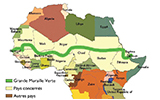 Heads of state and government and other stakeholders met on 27 July in Nouakchott to take stock of progress made in the implementation of the Great Green Wall. Participants at the third summit of leaders of the Pan-African Agency of the Great Green Wall (PAGGW) reaffirmed their objective to transform drylands into true rural development clusters by 2025. Their decisions aim to consolidate the gains of this vast project initiated in 2007. They form part of a harmonised strategy for the Great Green Wall, adopted in September 2012 by the African Ministerial Conference on the Environment and its 2015-17 Roadmap. "The necessary adaptation to climate change must necessarily go hand in hand with enhanced resilience of people, a prerequisite for a rational use of resources, for the sustainable use of land and essential preservation of rural heritage," Mauritanian President and PAGGW Chairman Mohamed Ould Abdel Aziz said. The Great Green Wall aims to build a vegetation barrier 7 000 km long and 15 km wide. Traversing eleven countries of the Sahara-Sahel region from Senegal to Djibouti, its objective is to combat the effects of climate change, desertification and biodiversity loss. The Global Environment Fund has announced funding of USD 15 million to support reforestation and ecosystem restoration and help finance various income-generating activities. The eleven countries that make up the Pan-African Agency of the Great Green Wall are Burkina Faso, Chad, Djibouti, Eritrea, Ethiopia, Mali, Mauritania, Niger, Nigeria, Senegal and Sudan.
Heads of state and government and other stakeholders met on 27 July in Nouakchott to take stock of progress made in the implementation of the Great Green Wall. Participants at the third summit of leaders of the Pan-African Agency of the Great Green Wall (PAGGW) reaffirmed their objective to transform drylands into true rural development clusters by 2025. Their decisions aim to consolidate the gains of this vast project initiated in 2007. They form part of a harmonised strategy for the Great Green Wall, adopted in September 2012 by the African Ministerial Conference on the Environment and its 2015-17 Roadmap. "The necessary adaptation to climate change must necessarily go hand in hand with enhanced resilience of people, a prerequisite for a rational use of resources, for the sustainable use of land and essential preservation of rural heritage," Mauritanian President and PAGGW Chairman Mohamed Ould Abdel Aziz said. The Great Green Wall aims to build a vegetation barrier 7 000 km long and 15 km wide. Traversing eleven countries of the Sahara-Sahel region from Senegal to Djibouti, its objective is to combat the effects of climate change, desertification and biodiversity loss. The Global Environment Fund has announced funding of USD 15 million to support reforestation and ecosystem restoration and help finance various income-generating activities. The eleven countries that make up the Pan-African Agency of the Great Green Wall are Burkina Faso, Chad, Djibouti, Eritrea, Ethiopia, Mali, Mauritania, Niger, Nigeria, Senegal and Sudan.
Article in French: http://cridem.org/C_Info.php?article=673580
Article in French: http://fr.alakhbar.info/9371-0-ille-Verte-.html
Article in French: http://www.grandemurailleverte.org/
Article in English: https://www.thegef.org/gef/great-green-wall
President Obama announces women's entrepreneurship centre in Bamako
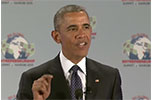 During a state visit to Kenya from 24 to 26 July, the American president expressed his country's desire to support the economic development of Africa by enlarging the space for women entrepreneurs, convinced "they will pay greater dividends to their community." Speaking at the 6th Global Entrepreneurship Summit, President Barack Obama praised the role of entrepreneurship, which he said provides a positive alternative to ideologies of violence and division. To support on-going initiatives on the continent, President Obama announced the creation of three women's entrepreneurship centres in Kenya, Mali and Zambia. The US government also announced USD 1 billion in funding to promote entrepreneurship in the world, of which a large part will be reserved for support to businesswomen. Finally, the US government reiterated its commitments announced during the US-Africa Leaders Summit in August 2014. It aims to strengthen African networks for early warning and rapid response and improve governance of the security sector.
During a state visit to Kenya from 24 to 26 July, the American president expressed his country's desire to support the economic development of Africa by enlarging the space for women entrepreneurs, convinced "they will pay greater dividends to their community." Speaking at the 6th Global Entrepreneurship Summit, President Barack Obama praised the role of entrepreneurship, which he said provides a positive alternative to ideologies of violence and division. To support on-going initiatives on the continent, President Obama announced the creation of three women's entrepreneurship centres in Kenya, Mali and Zambia. The US government also announced USD 1 billion in funding to promote entrepreneurship in the world, of which a large part will be reserved for support to businesswomen. Finally, the US government reiterated its commitments announced during the US-Africa Leaders Summit in August 2014. It aims to strengthen African networks for early warning and rapid response and improve governance of the security sector.
Article in English: https://www.facebook.com/USEmbassyMali
Video in English: https://www.facebook.com/usdos/videos/10152994083131074/
Burkina Faso secures financing for solar power plant
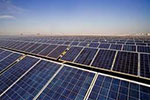 The proposed construction of the solar power plant at Zagtouli, near Ouagadougou, has received financial support from the European Investment Bank (EIB). The Burkina Faso government has negotiated a loan of CFA francs 15 billion to benefit the national electricity company in charge of building the plant. Designed to be one of the largest solar farms in sub-Saharan Africa, the Zagtouli plant will have a capacity of 33 megawatts built on about 60 hectares and should, according to the government, "provide viable and realistic solutions to the difficulties encountered in the field of energy, help reduce costs and pave the way for other solar energy projects in the country." The loan from the EIB adds to the CFA francs 14.7 billion in funding already secured from the French Development Agency (AFD) and CFA francs 16.3 billion from the European Union. It completes the required budget for the construction and operation of the solar plant, which is expected to be commissioned in mid-2017. Burkina Faso's electric power supply is currently provided by conventional power plants (46%), hydropower (8%) and energy imports from Côte d'Ivoire and Ghana on the order of 46%. The government hopes to boost the electrification rate to 75% by 2020, from 20% at present.
The proposed construction of the solar power plant at Zagtouli, near Ouagadougou, has received financial support from the European Investment Bank (EIB). The Burkina Faso government has negotiated a loan of CFA francs 15 billion to benefit the national electricity company in charge of building the plant. Designed to be one of the largest solar farms in sub-Saharan Africa, the Zagtouli plant will have a capacity of 33 megawatts built on about 60 hectares and should, according to the government, "provide viable and realistic solutions to the difficulties encountered in the field of energy, help reduce costs and pave the way for other solar energy projects in the country." The loan from the EIB adds to the CFA francs 14.7 billion in funding already secured from the French Development Agency (AFD) and CFA francs 16.3 billion from the European Union. It completes the required budget for the construction and operation of the solar plant, which is expected to be commissioned in mid-2017. Burkina Faso's electric power supply is currently provided by conventional power plants (46%), hydropower (8%) and energy imports from Côte d'Ivoire and Ghana on the order of 46%. The government hopes to boost the electrification rate to 75% by 2020, from 20% at present.
Article in French: http://www.burkinapmepmi.com/spip.php?article25126
Article in English: http://en.starafrica.com/news/eib-approves-15bn-fcfa-loan-for-burkinas-solar-project.html
UEMOA: Review of integration process ahead of summit
 The UEMOA Commission and high-level government officials from member countries completed work on the 2015 annual review devoted to assessing the implementation of community programmes and projects. Six countries have already hosted the review. This week it was the turn of Benin and Côte d'Ivoire. The review also includes a political component with Commission President Cheikhe Hadjibou Soumaré meeting with the Prime ministers of UEMOA countries. It demonstrates the Commission's commitment to assist states in correcting any deficiencies and improving their performance. The 2014 review revealed that "the general state of implementation of reforms in the Union is average, with a transposition rate of 59% for UEMOA Guidelines and an application rate for community texts estimated at 50%, with a disparity between states". The review comes just a few days before UEMOA leaders meet at the 19th Ordinary Session of the Assembly of Heads of State and Government, scheduled for 13 August 2015 in Cotonou.
The UEMOA Commission and high-level government officials from member countries completed work on the 2015 annual review devoted to assessing the implementation of community programmes and projects. Six countries have already hosted the review. This week it was the turn of Benin and Côte d'Ivoire. The review also includes a political component with Commission President Cheikhe Hadjibou Soumaré meeting with the Prime ministers of UEMOA countries. It demonstrates the Commission's commitment to assist states in correcting any deficiencies and improving their performance. The 2014 review revealed that "the general state of implementation of reforms in the Union is average, with a transposition rate of 59% for UEMOA Guidelines and an application rate for community texts estimated at 50%, with a disparity between states". The review comes just a few days before UEMOA leaders meet at the 19th Ordinary Session of the Assembly of Heads of State and Government, scheduled for 13 August 2015 in Cotonou.
Article in French: http://www.matinlibre.com/index.php/in-les-performances
African parliamentarians form network
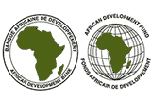 Under the leadership of the African Development Bank (AfDB), the African Parliamentarians' Network on Development Evaluation (APNODE) has become operational following its first general meeting, held from 23 to 24 July in Abidjan. Forty elected representatives from 14 African countries took part. During the meeting, the APNODE adopted its statutes, elected an executive committee and approved a programme of activities. The actions of the Network will aim to strengthen the capacity of African parliamentarians to improve their work related to monitoring, policy formulation and decision-making process by ensuring that gender equality concerns and the needs of vulnerable population groups are taken into account. Established in March 2014, supporters of the APNODE include the Bill & Melinda Gates Foundation, UNICEF, UNDP and UN Women. The Network is currently housed at the AfDB headquarters in Abidjan. It will move to Yaoundé in 2015 after the establishment of its first secretariat. The Network should soon enlarge to include about 20 African members countries of the AfDB Group.
Under the leadership of the African Development Bank (AfDB), the African Parliamentarians' Network on Development Evaluation (APNODE) has become operational following its first general meeting, held from 23 to 24 July in Abidjan. Forty elected representatives from 14 African countries took part. During the meeting, the APNODE adopted its statutes, elected an executive committee and approved a programme of activities. The actions of the Network will aim to strengthen the capacity of African parliamentarians to improve their work related to monitoring, policy formulation and decision-making process by ensuring that gender equality concerns and the needs of vulnerable population groups are taken into account. Established in March 2014, supporters of the APNODE include the Bill & Melinda Gates Foundation, UNICEF, UNDP and UN Women. The Network is currently housed at the AfDB headquarters in Abidjan. It will move to Yaoundé in 2015 after the establishment of its first secretariat. The Network should soon enlarge to include about 20 African members countries of the AfDB Group.
Article in French: http://www.afdb.org/fr/news-and-events/article/afdb-hosts-first-apnode-annual-general-meeting-14544/
Article in English: http://www.afdb.org/en/news-and-events/article/afdb-hosts-first-apnode-annual-general-meeting-14544/
FAO calls for USD 20 million to fight bird flu
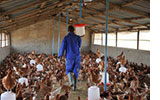 FAO has expressed growing concern over the bird flu outbreak in West Africa. In a 20 July statement, the UN agency called for USD 20 million to slow the spread of avian influenza virus H5N1 in the region. The FAO warned that a rapid response is needed to contain outbreaks of the highly virulent virus before further spread throughout the region and beyond is inevitable. The FAO's concerns have a strong basis. Five countries - Burkina Faso, Côte d'Ivoire, Ghana, Niger and Nigeria - have registered reported outbreaks of bird flu. The head of FAO's Animal Health Service Division, Juan Lubroth, said it is crucial to strengthen veterinary investigation and reporting systems in the ECOWAS zone before the virus is transmitted to humans. The first H5N1 outbreak in West Africa began in 2006 and was eliminated in 2008. The virus reappeared in late 2014 in Nigeria. To date, more than 1.6 million poultry have been culled or have died from the virus.
FAO has expressed growing concern over the bird flu outbreak in West Africa. In a 20 July statement, the UN agency called for USD 20 million to slow the spread of avian influenza virus H5N1 in the region. The FAO warned that a rapid response is needed to contain outbreaks of the highly virulent virus before further spread throughout the region and beyond is inevitable. The FAO's concerns have a strong basis. Five countries - Burkina Faso, Côte d'Ivoire, Ghana, Niger and Nigeria - have registered reported outbreaks of bird flu. The head of FAO's Animal Health Service Division, Juan Lubroth, said it is crucial to strengthen veterinary investigation and reporting systems in the ECOWAS zone before the virus is transmitted to humans. The first H5N1 outbreak in West Africa began in 2006 and was eliminated in 2008. The virus reappeared in late 2014 in Nigeria. To date, more than 1.6 million poultry have been culled or have died from the virus.
Press release in French: http://www.fao.org/news/story/fr/item/297774/icode/
Press release in English: http://www.fao.org/news/story/en/item/297715/icode/
SWAC Viewpoint - Changing demographics pulling up agriculture
SWAC Secretariat economist Thomas Allen says that population dynamics - its growth and spatial distribution - can provide new perspectives on West Africa's agricultural performance and future prospects. In his article, published in the Great Insights magazine focusing on "Territorial Development", he highlights the impacts of population changes and their implications for food security strategies. He also presents Africapolis, a unique database on urbanisation in West Africa that provides previously unpublished information. > read the article
Who's Who? Xavier Crespin, Director General of the West African Health Organisation
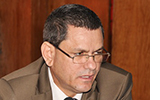 Dr Xavier Crespin has been the head of the West African Health Organisation (WAHO) since the first quarter of 2014. The Nigerien doctor is a specialist in public health, nutrition, administration and management of health services as well as health policy and finance. Xavier Crespin has over 25 years experience in the health field. He served as representative/director of the American NGO Helen Keller International in Niger and Cameroon. He led the Young Child Survival and Development section at UNICEF before being named head of WAHO. It is under his leadership that the institution, created by ECOWAS heads of state and government, celebrated its 28th anniversary on 9 July under the theme of "the contribution of mobile phones in the management of epidemics at the community level". In a message issued on the occasion of the commemoration, Dr Crespin pledged to focus on communication and the use of new information and communications technology to make health interventions more effective, in accordance with the vision of the Community Strategic Plan (2016-20) for WAHO.
Dr Xavier Crespin has been the head of the West African Health Organisation (WAHO) since the first quarter of 2014. The Nigerien doctor is a specialist in public health, nutrition, administration and management of health services as well as health policy and finance. Xavier Crespin has over 25 years experience in the health field. He served as representative/director of the American NGO Helen Keller International in Niger and Cameroon. He led the Young Child Survival and Development section at UNICEF before being named head of WAHO. It is under his leadership that the institution, created by ECOWAS heads of state and government, celebrated its 28th anniversary on 9 July under the theme of "the contribution of mobile phones in the management of epidemics at the community level". In a message issued on the occasion of the commemoration, Dr Crespin pledged to focus on communication and the use of new information and communications technology to make health interventions more effective, in accordance with the vision of the Community Strategic Plan (2016-20) for WAHO.
Article in French: http://www.lexpressdufaso-bf.com/inc4ac14&l_idpa=291
Message from the WAHO Director General in French: http://www.wahooas.org/IMG/pdf/Message-Dg_JrneeOOAS_Frcais.pdf
Message from the WAHO Director General in English: http://www.wahooas.org/IMG/pdf/Message-Dg_JourneeOOAS_Anglais.pdf
